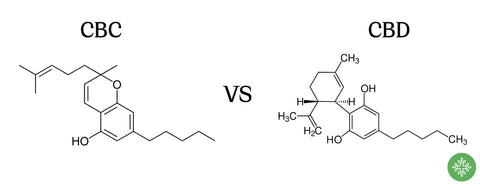Cannabichromene, or CBC, is a lesser-known cannabinoid with a shared source as the most popular compounds, tetrahydrocannabinol (THC) and cannabidiol (CBD), which interacts with the body's endocannabinoid system.
They all come from the mother cannabinoid CBGa (cannabigerolic acid), which then becomes either THCa, CBDa, or CBCa — though in much smaller concentrations, which is why its other siblings often overshadow it.
Like CBD, CBC doesn't have psychoactive effects that result in a cannabis "high," but it may have the potential for neuroprotective benefits.

CBC Compared to CBD
The main differences between CBC and CBD are the molecule structures and concentrations in the hemp plant.
CBC is often mistaken in lab tests for CBD. However, CBC has a unique chemical structure of its own (C21H30O2), which lends a slightly unique effect profile (which we'll get into more detail shortly).
The most notable difference is CBC's affinity to vanilloid receptors (TRPA1 and TRPV1), which play an important role in pain perception and cell function [1].
This is because they have different cannabinoid structures, which will change the effects on the binding of cannabinoid receptors. These nuanced differences in molecular structure and receptor interaction ultimately influence the potential therapeutic benefits and effects of each cannabinoid.

The distinctive structures of CBD and CBC mean that they don't bind to these receptors similarly. For instance, while CBD is known to have a low affinity for these receptors and instead influences them indirectly, the binding affinity and behavior of CBC is still a research topic.
CBC and CBD Usage
Originating from the same source, the hemp plant, their extraction process yields compounds that can be integrated seamlessly into a wide range of products, further broadening their appeal.
Both CBC and CBD, once extracted, can be suspended in carrier oils, creating tinctures that users can take sublingually (under the tongue) for fast absorption. These tinctures are often favored for their ease of use and dose precision. The relatively neutral taste of these cannabinoids allows them to be infused in various edibles, from chocolates and gummies to baked goods and even beverages.
Regarding application, CBC and CBD are extracted from the hemp plant, which can then be incorporated into various products, from oils/tinctures to topicals and edibles. This versatility has made them popular choices for those exploring holistic wellness options.
Topical applications have also emerged as popular vehicles for these cannabinoids. Creams, lotions, balms, and bath bombs enriched with CBC and CBD are gaining traction in the wellness market. These topicals can be applied directly to the skin, targeting areas of discomfort or simply offering a luxurious skincare experience. The skin's vast network of endocannabinoid receptors allows for localized effects, making topicals an attractive option for issues like muscle soreness or skin conditions.
When to Use CBC or CBD

Correctly timing your doses can significantly influence the effectiveness and experience of both CBC and CBD.
First and foremost, identify the purpose behind taking either CBC or CBD. Are you aiming to improve sleep, address discomfort, enhance focus, or uplift mood? Your goals will largely dictate the ideal timing.
Timing for Sleep
CBD has become a popular natural product to support a healthy sleep cycle. Many people find that consuming CBD 30 minutes to an hour before bedtime can be beneficial for relaxing the mind and body, as CBD is often associated with its calming effects.
While CBC's direct impact on sleep is less well-established than CBN and CBD's, early users and anecdotal evidence suggest that it can complement sleep routines. Consider a similar timeframe as CBD if using CBC for sleep enhancement.
Timing for Pain Relief
For those seeking a hemp-derived cannabis product for discomfort, maintaining a consistent regimen is often recommended. Some individuals take CBD in divided doses throughout the day — morning, mid-day, and evening — to achieve their desired effects. This can be easily achieved with pre-doses measured CBD capsules or CBD gummies. For those who want more customization in their dosing, the strongest CBD oil offer much more versatility.
While more studies are needed to confirm its effects, there's anecdotal evidence to suggest that some people appreciate the combination of CBC with CBD when addressing discomfort. This pairing is thought by some to potentially amplify the overall wellness benefits through the entourage effect — the theory that the combined presence of various cannabinoids and terpenes in the cannabis plant can enhance their individual effects.
CBC and CBD, when taken together, can potentially amplify each other's wellness benefits through this effect. Full spectrum or broad spectrum cbd oils, which contain a range of cannabinoids, including CBC and a variety of terpenes, are often chosen by those seeking to experience this synergistic phenomenon.
Timing for Focus
While CBD is usually associated with relaxation, smaller doses can lead to heightened alertness. Consider taking CBD in the morning or early afternoon if you're using CBD to enhance focus. Or consider a CBD and CBG-balanced oil.
CBG, another non-intoxicating cannabinoid, is believed by some to promote clarity and focus, making the combination a potential choice for those aiming to boost productivity without the sedative effects.
CBG also shares a similar origin as it too comes from CBGa (cannabigerolic acid), the precursor to multiple cannabinoids. CBC and CBG are both non-psychoactive, yet their unique interactions with the body may influence wellness goals differently, making one potentially more suited for applications like mood support, while the other may be preferred for focus and inflammation support
Information on CBC's direct impact on focus is still sparse. It's best to experiment with small doses during daytime hours to gauge its effect on your concentration.
Timing for Mood
To potentially uplift or stabilize mood, consider integrating CBD into your morning routine. Its calming effects can help set a positive tone for the day.
We hate to sound like a broken record, but more research is needed for CBC's potential benefits on mood. However, anecdotal reports suggest that CBC may have mood-enhancing properties. Like with CBD, morning dosing can be a good starting point.
General Tips
- Start Slow: Especially if you're new to cannabinoids, it's advisable to start with a lower dose and gradually increase until you find your optimal amount.
- Keep a Journal: Tracking your dosing, timing, and effects can be immensely helpful. This allows you to adjust and refine your routine over time.
- Consult a Professional: Always seek advice from a healthcare professional familiar with cannabinoids to guide your journey, especially if you're on medications or have a health condition.
CBD and CBC Similarities
Besides cannabinoids being harvested from cannabis plants, CBD and CBC are non-psychoactive. This means that, unlike delta 9 THC, they won't produce the "high" or euphoric feeling commonly associated with marijuana. This feature has made them especially attractive to individuals who are interested in exploring the potential benefits of cannabinoids without the intoxicating effects.
CBD and CBC have been noted for their anti-inflammatory properties in terms of potential therapeutic benefits. While research is ongoing, preliminary studies and anecdotal evidence suggest that these cannabinoids might play a role in addressing inflammation and related discomfort.
Lastly, an essential point to emphasize is the safety profile of these compounds. Neither CBD nor CBC has been associated with severe side effects when used responsibly. Of course, as with any supplement or health product, it's crucial to use them in moderation and consultation with healthcare professionals.
CBC vs. CBD Differences
To begin with, THC and CBD have taken the forefront regarding research. Over the past few years, many studies have delved into CBD's potential therapeutic benefits and properties. Its effects, safety profile, and potential applications have been scrutinized more thoroughly, leading to a better understanding of this cannabinoid.
In contrast, although promising in its preliminary findings, CBC has yet to be as extensively researched. This difference in scientific attention can be attributed to CBD's earlier discovery and its rapid rise in popularity.
CBC is less abundant compared to CBD. This rarity makes the extraction process for CBC more intricate, and, as a result, CBC is less commonly found in consumer products. Manufacturers might find it more challenging to produce CBC-rich products due to this limited presence in the plant. In contrast, CBD, being more abundant, is easily extracted and formulated into various offerings.
Furthermore, CBD's recognition in the wellness industry has made it more widely accepted by consumers. Over the past several years, as information about CBD's potential benefits spread, it quickly became a household name, resulting in an array of CBD-infused products flooding the market. On the other hand, CBC, being newer to the scene and less abundant in products, has yet to achieve the same level of consumer recognition and acceptance.
CBC vs. CBD For Anxiety
The FDA has not endorsed CBD as a treatment for anxiety or any specific condition. On the other hand, CBC remains less researched in this context and is in its early stages regarding research in this realm.
CBC Oil vs. CBD Oil

For those already acquainted with CBD's reputed effects and looking for a powerful product, our potent CBD oil, boasting a substantial high cbd 12000 MG, stands out.
This concentration ensures that users receive a robust and practical experience, making it especially suitable for those who have already incorporated CBD into their wellness routines and are familiar with its nuances.
However, the world of cannabinoids doesn't end with CBD.
Venturing into the lesser-trodden paths, our CBC oil emerges as a pioneering product. Being among the first of its kind in the market, it presents a unique opportunity.
While CBC remains relatively uncharted compared to its popular counterpart, CBD, our CBC oil invites users to explore the potential benefits and effects of this emerging cannabinoid. For the adventurous and curious, it's a chance to be at the forefront of a new wave in holistic wellness, offering a fresh perspective on what the hemp plant offers with the same high quality and attention to detail our customers have come to expect with our CBD products.
The Takeaway: CBC vs. CBD Overall
CBD, with its wide recognition and a substantial body of research, has already established its significant presence in the wellness landscape. Its potential benefits have made it a staple for many. Yet, in its shadows, CBC emerges as a promising newcomer, full of untapped potential and curiosity. As the scientific community delves deeper, CBC might soon share the spotlight with CBD, unveiling more avenues for holistic health.
Navigating this expanding universe requires both information and a dash of adventurous spirit. While we're all acquainted with CBD's potential, introducing CBC might be the next step in your wellness journey.
Experience the best of both worlds by exploring our range of products at Neurogan.
You'll find the highest quality standard with our premium yet affordable CBD and CBC offerings. Tailor your wellness journey with the finest, and let our products be your trusted companions on this path of discovery.


